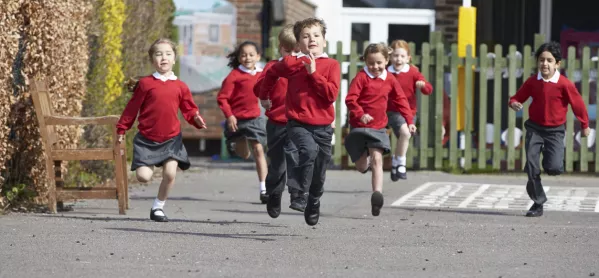Playground duty is probably not high on your list of priorities for September. Often seen as a necessary evil/chat with colleagues/rest, it is probably the least of your worries.
But those seemingly innocuous few minutes contain high risks: huge numbers of children in a large space equals potential for disaster. Even if smaller ‘bubbles’ remain the norm for some time, the playground can be tricky to manage.
Teachers “can be reasonably directed to supervise pupils during break times” according to the NEU teaching union. But there is no official advice about how to do this and individual schools are left to manage risks themselves.
Beyond the mechanics of timing, bells and whistles, and exiting and entering strategies, many schools may also give little guidance.
So, what do we do?
Of those genuinely committed to doing a good job, I’ve observed that people tend to adopt one of two general approaches: patrol or presence.
Patrollers
This teacher tends to circulate alone or with another staff member, focusing on trouble spots - roaming bullies, disgruntled footballers, the misunderstood.
They use body language - the frown/raised eyebrows/nod - to show awareness of situations and a readiness to intervene, if needed.
Patrollers generally ignore the hand-holders of this world, telling them to go and play. They believe children should learn how to sort problems for themselves, and as an antidote to helicopter parenting, hope to nurture skills like negotiation and compromise.
Patrollers have worthy principles, which work well in schools with clear behaviour polices and structured PSHE teaching. Once modelled, empathy and self-awareness are ideally rehearsed in a less structured environment, like the playground.
But if learning is not constantly reinforced by adults - the SLT in assembly, teachers in classroom, SMSAs at lunchtime - patrollers are fighting a losing battle. Children will not learn these things by osmosis.
Presents
This teacher circulates alone or with a hand-holder, greeting children, asking about the weekend or the new baby. Like the Patrollers, they also drift towards trouble spots but they’re always trying to pre-empt problems by building relationships, in the corridor as well as the playground. They comment on cool haircuts or good goals.
Presents like children to know they’re interested in them. They understand that when emotional tanks are full, people are more likely to act reasonably when things go wrong.
This approach is harder work but can be an effective way of ensuring a more peaceful playground. However, if a child has had a terrible lesson or fallen out with a parent, there may be nothing you can do to pre-empt trouble. It’s how you deal with it that counts.
This playground presence will be more effective if the school has core values on display and frequently referred to them. This will enable you to be consistent and use a familiar script that your troubled children will understand. When your presence is not enough, your calm, controlled reinforcement of learned values will be.
Which is best?
When asked, children have told me they want to know the duty person is looking after them as individuals. But for this to happen, staff need to work strongly as a team, developing and using school-wide policies and scripts. If that is in place, then both patrol and presence will be effective for pupils.
Deborah Jenkins is a primary teacher and freelance writer




